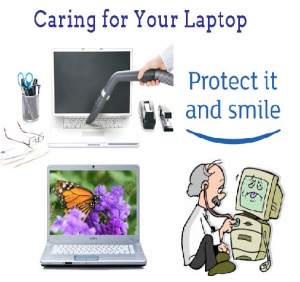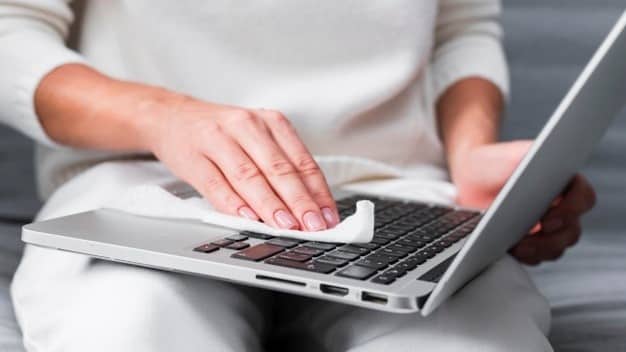
In this blog, I’ll underline various rules to go by on how to take care of your new laptop. That’s because laptops are meant to be portable, and it’s a known fact that portable devices go through more wear & tear than fixed devices – hence they require good care. Moreover, it is easy to overlook their role as an invaluable productivity tool that’s also flexible – enabling you to work in locations in which it would be impossible to work if you had a desktop PC. In addition, laptops are typically more expensive than desktops, and repairing them is typically harder and requires a somewhat more expertise.
Care for your laptop’s battery:
Your new laptop’s battery will wear out eventually, but you can prolong its life by taking good care of it. Your laptop battery’s biggest enemy is heat. One way you can avoid battery degradation is to remove the battery from the laptop – only placing it back in for when you need to move around with the laptop.
Avoid eating or drinking near your laptop:

Eating and/or drinking near your laptop may seemingly appear as a harmless act, but there is good reason why you shouldn’t do it. First, by drinking beverages near your laptop, you run the risk of spilling your drink on your laptop – if that happens, kiss your laptop’s motherboard goodbye. Next, when you eat near your laptop, there’s a possibility that you will drop food crumbs on or near your laptop’s keyboard – attracting insects. Consequently, these insects will eventually find their way into the warm environment inside your laptop – potentially damaging the internal circuitry.
Always use a carrying case/bag while travelling with your laptop:
Before you hit the road, make sure your laptop is secured – by secure I mean nice and snug inside a laptop carrying case or a laptop bag. Choosing a laptop bag is also crucial – avoid buying something cheap, as they can end up costing you more – considering the fact that they are most likely cheaply built and don’t have the appropriate padding to provide protection against bumps and scrapes. Therefore, when looking for a laptop bag, make sure it has decent amount of padding and is comfortable to carry around.
Install security software on your laptop:
In order for your laptop to function normally, you not only have to care for it on the outside, but also on the inside. This usually means installing security software such as an antivirus software and data security suite which can act as a virtual folder lock – preventing hackers from attacking your PC and stealing your personal data.
Clean your laptop at least once a week:
Do you sometimes have trouble reading the screen because dust and grime has built up your laptop’s monitor screen? Well, cleaning your laptop regularly will ensure that your laptop won’t accumulate dirt. To clean your laptop, make sure that you have a microfiber cloth handy. Take equal parts 50/50 of distilled water and white vinegar, mix them together in a spray bottle and you got yourself not only a organic laptop cleaner – but also one that works more effectively and safely than other spray cleaners developed specifically for cleaning electronics. Though, before cleaning your laptop, make sure to completely shut down your laptop, remove its battery and then clean it – also make sure that you don’t directly spray on the laptop, instead spray on the cloth and then gently rub the laptop’s surface area in a clockwise motion. Keep in mind: before you boot up your laptop – make sure to wait 10 minutes for the laptop to dry out.
Things To Do When First Get A New Laptop
1. Install antivirus software: Make sure to install antivirus software on your new laptop to protect your data from malicious software and cyber attacks.
2. Backup important files: Make sure to back up important files such as documents, photos, music, and videos to an external drive or cloud storage.
3. Update your operating system: Make sure to update your operating system to the latest version to stay secure.
Charge My New Laptop For 8 Hours
You don’t need to charge your new laptop for 8 hours. Most laptops come with a battery that is pre-charged, so you can start using it right away. However, it is recommended to charge your laptop to full at least once a month to keep the battery healthy.
Laptop Charging Limit
It is recommended to charge your laptop until it reaches 100% for optimal battery life. This will ensure that your laptop is able to hold its charge for longer periods of time and that it is able to recharge quickly when needed.
Use Laptop While Charging
No, it is not harmful to use your laptop while it is charging. However, it is recommended to use your laptop on a low power setting while it is charging, as this will help to reduce the amount of heat generated and help to extend the life of your laptop’s battery.
Life Time Of A New Laptop
The average lifespan of a laptop is typically between 3-5 years, although this can vary depending on the model and how it is used. To get the most out of your laptop, it is important to take care of it, including regularly updating the software, keeping the battery charged and using it in a low power setting.
Hardest Part To Replace In A Laptop
The hardest part to replace in a laptop is usually the motherboard. This is because it is the main component that houses all of the other components and is responsible for controlling the entire system. Replacing the motherboard requires a lot of technical expertise and can be quite expensive.
Do’S Of A New Laptop
Do’s:
• Use the laptop in a well-ventilated area and keep it away from direct sunlight.
• Read the user manual and follow the instructions to ensure proper usage and maintenance.
• Update the software regularly and keep the laptop battery charged.
• Use the laptop in a low power setting to conserve energy. Don’ts:
Things That Can Ruin A Laptop
• Overheating: When your laptop is exposed to high temperatures, it can cause permanent damage to the components.
• Physical Damage: Dropping, spilling liquids, or exposing your laptop to dust or dirt can damage its components.
• Malware and Viruses: Malicious software can corrupt your laptop’s data and slow down its performance.
• Power Surges: Power surges can cause permanent damage to your laptop’s hardware.
• Overcharging
Method To Clean A Laptop Fan
1. Shut down your laptop and unplug it from the power source.
2. Use a can of compressed air to blow out any dust or dirt that has accumulated inside the fan.
3. Use a cloth and rubbing alcohol to gently wipe down the fan blades.
4. Use a vacuum cleaner to remove any remaining dust or dirt.
5. Reassemble the laptop and plug it back into the power source.
Place To Put My Laptop When Not In Use
It is best to store your laptop in a cool, dry place when not in use. Avoid storing it in direct sunlight or in a place with high humidity, as this could damage the internal components. Additionally, it is best to store it in a case or sleeve to protect it from dust and other debris.
Not To Do With Laptop
It is important to avoid certain activities when using a laptop, such as:-Leaving it on when not in use
-Using it on an unstable surface
-Overheating the laptop by leaving it in direct sunlight or in a place with high humidity
-Using it in a dusty or dirty environment
-Using it in a place with extreme temperatures
-Using it near liquids or other sources of moisture
-Dropping it or subjecting it to physical shock
Is It Ok To Leave Laptop Lid Open?
Yes, it is generally safe to leave the laptop lid open. However, it is important to make sure that the laptop is placed on a stable surface and that the fan is not blocked. Additionally, leaving the laptop lid open can cause the laptop to overheat if it is left in direct sunlight or in a place with high humidity.
Ways To Keep Laptop Healthy
To keep your laptop healthy, it is important to keep it clean and dust-free, make sure it is not exposed to extreme temperatures, avoid using it near liquids or other sources of moisture, and avoid dropping it or subjecting it to physical shock. Additionally, it is important to ensure that the laptop is placed on a stable surface and that the fan is not blocked. Finally, it is important to make sure that the laptop is not left in direct sunlight or in a place with high
Things Not To Touch On A Laptop
It is best not to touch any of the internal components of a laptop, such as the processor, RAM, hard drive, and motherboard. Additionally, it is best not to touch the laptop’s ports, such as the USB ports, audio ports, and video ports.
Shut Down Laptop After Every Use
It is not necessary to shut down your laptop after every use. However, it is recommended to shut down your laptop if it will not be used for an extended period of time. This will help conserve battery life and reduce the risk of overheating.
Can I Leave My Laptop Plugged In 24/7?
Yes, you can leave your laptop plugged in 24/7 as long as it is not in an area with extreme temperatures. Additionally, it is important to make sure the laptop is plugged into a surge protector to protect it from power surges.
Do Laptops Get Damaged If Not Used?
Yes, laptops can get damaged if not used for an extended period of time. This is because components can degrade over time, and dust and dirt can accumulate on the laptop’s internal components. To help prevent damage, it is important to use the laptop regularly and to shut it down when not in use.
Best Way To Protect Laptop Screen
To protect your laptop screen, you should use a laptop screen protector. These protectors are designed to cover the entire screen and protect it from scratches and dust. Additionally, you should avoid touching the screen directly with your fingers, as this can cause smudges and smears. Finally, you should make sure to clean the screen regularly with a soft, lint-free cloth.
